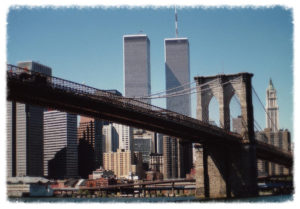 By September 11, 2001, I had become accustomed to my phone ringing at all hours of the day and night. But on that Tuesday morning, it was my wife’s phone that rang at 5:50 a.m., not mine. It wasn’t the office calling. It wasn’t my partner, nor my lieutenant, nor an informant, witness, or a victim’s loved one checking in. It was one of our dearest friends spreading the news. Her usually jovial voice was subdued, dark, quivering as she reported that an airplane had crashed into the World Trade Center. It was the day America changed.
By September 11, 2001, I had become accustomed to my phone ringing at all hours of the day and night. But on that Tuesday morning, it was my wife’s phone that rang at 5:50 a.m., not mine. It wasn’t the office calling. It wasn’t my partner, nor my lieutenant, nor an informant, witness, or a victim’s loved one checking in. It was one of our dearest friends spreading the news. Her usually jovial voice was subdued, dark, quivering as she reported that an airplane had crashed into the World Trade Center. It was the day America changed.
The Hour of Serenity
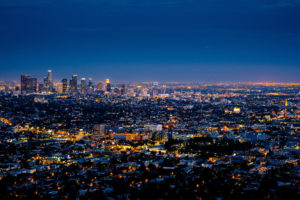 Many Angelinos had not yet risen; some were just starting their days. Years earlier, when I had worked patrol on the graveyard shift, that was the time of morning that was the calm after the storm. It was the hour of serenity, that last hour of the night when the glow on the eastern horizon would promise a new day in America. It was the time when coffee was consumed on the hoods of radio cars and tired cops either looked forward to going to bed or dreaded a day of court ahead of them. Reports would be finalized and dropped into the sergeant’s tray. Radio cars would be gassed up for the oncoming shift. And red-eyed deputies would lug their war bags, weapons, and equipment into the station and stow it away until their next shift.
Many Angelinos had not yet risen; some were just starting their days. Years earlier, when I had worked patrol on the graveyard shift, that was the time of morning that was the calm after the storm. It was the hour of serenity, that last hour of the night when the glow on the eastern horizon would promise a new day in America. It was the time when coffee was consumed on the hoods of radio cars and tired cops either looked forward to going to bed or dreaded a day of court ahead of them. Reports would be finalized and dropped into the sergeant’s tray. Radio cars would be gassed up for the oncoming shift. And red-eyed deputies would lug their war bags, weapons, and equipment into the station and stow it away until their next shift.
But on rare occasions, the peacefulness of that sacred hour could be shattered by the sudden crackling of the police radio: someone had been shot; someone had been beaten; someone had been raped and murdered and left in the park. Six hours earlier, those calls were routine. But now—an hour before sunrise—a call like that could be a jolt to the most seasoned cop.
September 11, 2001
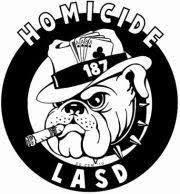 I had been a homicide detective for four years and had grown accustomed to telephonic announcements of death. In the dark of night, I would jot the details into a notebook with little reverence for the newly departed. At that point, it was just another entry in my case journal, a new name that would become the focus of my undivided attention for at least 48 hours. The reverence would come later, at the scene or in the living room of the victim’s loved one.
I had been a homicide detective for four years and had grown accustomed to telephonic announcements of death. In the dark of night, I would jot the details into a notebook with little reverence for the newly departed. At that point, it was just another entry in my case journal, a new name that would become the focus of my undivided attention for at least 48 hours. The reverence would come later, at the scene or in the living room of the victim’s loved one.
Occasionally, even those otherwise routine notifications arrived with an an unexpected snag: a cop had been killed; a woman was murdered at Phil Spector’s castle; a kid had been thrown off a goddam cliff…
But no call in my lifetime has ever rivaled the one my wife and I received that morning.
America was Under Attack.
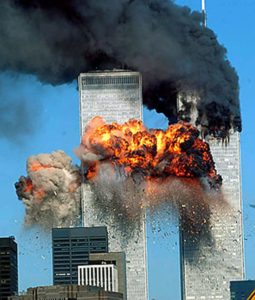 We turned on the TV and watched replays of a commercial airliner plowing into the World Trade Center in New York City. Fellow Americans—fathers and mothers, husbands and wives, Americans accustomed to living in relative peace on our sacred land—leapt from broken windows and sailed through the skies to their certain deaths. These images were seared into our minds, as they were into yours.
We turned on the TV and watched replays of a commercial airliner plowing into the World Trade Center in New York City. Fellow Americans—fathers and mothers, husbands and wives, Americans accustomed to living in relative peace on our sacred land—leapt from broken windows and sailed through the skies to their certain deaths. These images were seared into our minds, as they were into yours.
Within moments of the first strike, it became clear what was happening when a second airliner tore into the other tower. Until that moment, there was still hope. Hope that it had been a tragic accident, not a declaration of war. Once that hope was removed, sadness turned to anger and rage.
Like many of my fellow Americans, I wanted revenge. I wanted war. I wanted to scorch the earth beneath the dirty feet of our enemies abroad, those zealots who hate us for the freedom and prosperity we represent.
Explaining it to the Kids
Soon, we were joined by our young daughters. “What’s wrong, Daddy? What’s happened? Why are you crying?”
Seven and four. How do you explain it?
I explained it the same way I had cautioned them about strangers: there are evil people in this world. Then we held them tightly and assured them we would all be okay, as I silently questioned their future.
An hour quickly passed. Calls were made. We openly grieved with family and friends throughout the morning.
Department Goes on Full Alert
I called my partner, Bob Kenney. He and I had been working long hours on our recent assignment, the case of sixty-seven-year-old Nada Lazarevic who had disappeared and had almost certainly met her demise. That morning, a surveillance team was scheduled to follow our suspects: the bad daughter and her idiot husband, both of whom would later be convicted of first-degree murder.
The department had gone on alert, which meant we were to be ready to respond as needed. Many units were staged and prepared for anything that might come our way, including the surveillance team that had been scheduled to begin tailing our suspects. At Homicide, we were told to go about our business, but to stay available.
Nada Lazarevic had lived in Palmdale, California, a community located in the high desert region of Los Angeles County, seventy miles north of downtown Los Angeles. By 2001, Palmdale had been populated by a mass migration of families who moved there seeking affordable housing or reprieve from the gangs and violence of Los Angeles. It had become one of the most diverse communities in the southland, where any given tract of homes could feature families of every ethnicity, and immigrants from around the world, even Yugoslavia.
Working Our Case
On that day, Bob and I shuffled from one home to another in what is known as a neighborhood canvas. How well did you know your neighbor? When did you last see her? Do you know her daughter and son-in-law? Have you seen them at the house in the last few days? The setting didn’t vary from home to home. No matter the ethnicities, social statuses, or political affiliations of those we contacted, every single home was the same: families were huddled near their televisions, fretful, sorrowful. No true American smiled that day.
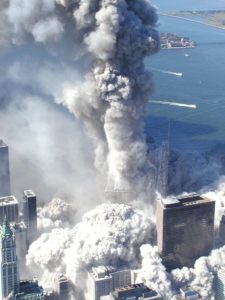
We asked our questions and received answers while those shocking images played on a continuous loop. Every house, each family, the same images over and over—planes crashing into towers, smoke billowing into the sky, frantic civilians running from the burning buildings while New York’s finest ran into them.
It often seemed our intrusions were welcomed distractions, brief diversions from their grim fixations. For those of us who were wired to solve problems, who instinctively placed ourselves in harm’s way to help our fellow man, carrying on—as awkward as it seemed—was exactly what we needed to do, and it’s what we did.
The Day America Changed
Later that evening I returned home. The kids were playing. My wife had started dinner. It was peaceful. Normal. My wife had turned the TV off after our daughter had come home from school, saw the images still playing, and asked if it had happened again.
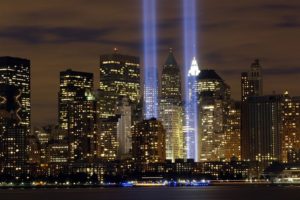 America changed that day, but her foundation remained solid. Life would go on, albeit very differently for every one of us. Many sacrifices were made. That day, and during the weeks, months, and years that followed. To this very day, they are still being realized, at home and abroad.
America changed that day, but her foundation remained solid. Life would go on, albeit very differently for every one of us. Many sacrifices were made. That day, and during the weeks, months, and years that followed. To this very day, they are still being realized, at home and abroad.
America changed, and she will never be the same. But we will prosper as One Nation under God.
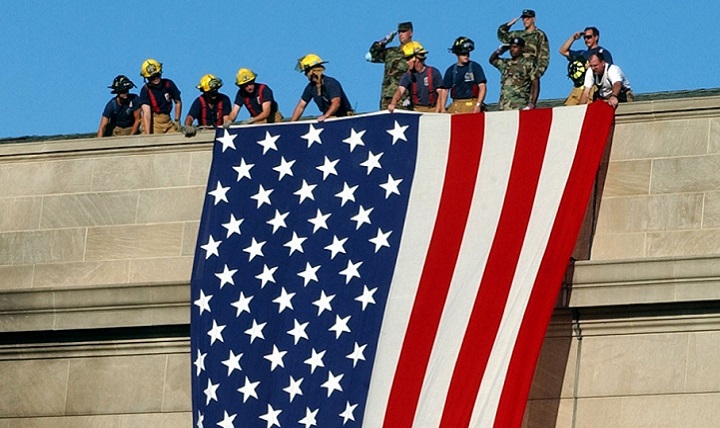
* * *
Thank you for reading my blog. I hope you will share it with your family and friends.

I remember that day, it indeed was a Tuesday. I had knee surgery the Friday before. My mom came in waking me up say, “TURN THE TV ON” As I reached for my remote I turned over and turned the TV on. I saw the recap of the 1st plane into the tower. Filled by the live view of the 2nd plane. It was the only day I remember in which EVERY tv channel was dark. They all said something ” Due to recent events programing has been cancelled.” It’s definitely I day I will always remember.
Thank you for sharing your story. drs
I happened to be up early that day, driving to lend an extra hand at a friend’s job for a special project, and so heard the horrible news as it was reported. Of course, I began crying — had I been thinking straight, I would have pulled off the road.
Arriving at my friend’s office, we hugged and cried as we watched the television news coverage. I can’t recall what time the attack on the Pentagon occurred. We were finally so overwrought that we left the TV in the next room on, so we could hear the reports, but could no longer bear to watch the images. We went on to shuffle some paperwork.
That evening, I called an older friend whose son lived and worked in Manhattan, to ask if Chris was safe. Little did we know that Chris’ office had recently been moved into the Twin Towers!
Chris had indeed survived, as did everyone he directly supervised, since he cleared the 9th floor office & pushed everyone down the stairs the moment the first plane struck.
Unfortunately, they got outside in time to witness the second plane crashing. Most stayed put, because usual transportation was disrupted. And they were hoping that coworkers and friends who worked on higher floors would safely emerge.
Instead, they witnessed people leaping out of windows to their deaths.
I count myself lucky, that the only person that I knew who was inside the twin towers that day survived, and helped others out to safety.
It was an event so horrible I don’t know the words to describe how I felt.
But I’m also left with the memory of how so many Americans came together that day to help others in the face of a terrorist attack of enormous proportions.
Many of these heroes gave their lives to fight to save the lives of strangers. In fact, we are still losing people, primarily first responders at the twin towers, from toxin exposure.
I only hope that I could be as brave a person as the folks on Flight 93, who opted to stop a portion of the planned terrorist attack by fighting the terrorists aboard, forcing the plane to crash in a rural part of Pennsylvania, making the ultimate sacrifice.
September 11 has aptly been designated Patriot’s Day.
Valerie, thank you for sharing this extraordinary story. Yes, those brave passengers on Flight 93–unbelievable! This will be a heavy day for all of us, for all of our lives. drs